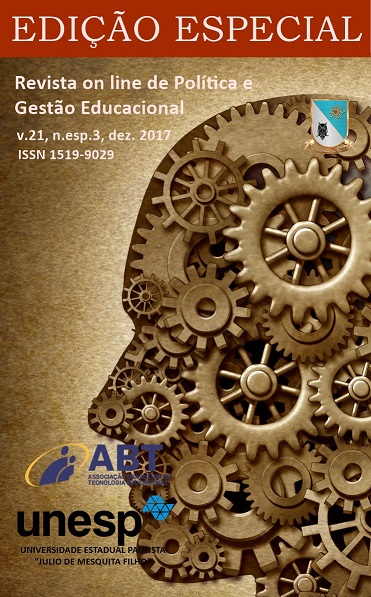Use of educational object on the perspective of the special education: report about a pedagogic pratice
DOI:
https://doi.org/10.22633/rpge.v21.n.esp3.2017.10051Keywords:
Special education. Educational object. Software. Teaching and learning.Abstract
This research aimed to describe an experience of using educational software for all students, and especially for students with Autism Spectrum Disorder enrolled in classroom early childhood education. A research was carried out in the international repository of Educational Objects on the link on the Early Childhood Education, it was made the choice of software called JClic for the realization of educational activity. The activity was held in a classroom in kindergarten twenty-two students aged between four and five years and had two students with greater difficulty in communication, and the student G. diagnosed with autism and student with M. communication difficulties in oral form. The data were analyzed qualitatively based on the observation and recording performed by the researcher and following the reporting methodology of case studies. The JClic software, such as learning object was used in this study, however, is extremely important report that the teaching practice, mediated by the teacher, potentiated and contributed to expressiveness and creativity of students enrolled in early childhood education, especially for those with difficulties communication, such as the student with Autism Spectrum Disorder.
Downloads
References
AMERICAN PSYCHIATRIC ASSOCIATION, Manual diagnóstico e estatístico de transtornos mentais: DSM 5. Porto Alegre, RS: Artmed, 2014.
AUDINO, D. F.; NASCIMENTO, R. da S. Objetos de aprendizagem – Diálogos entre conceitos e uma nova proposição aplicada à Educação. Revista Contemporânea de Educação, Rio de Janeiro, vol. 5, n. 10, p. 128-148, jul/dez 2010.
BRASIL. Ministério de Educação e do Desporto. Referencial curricular nacional para educação infantil. Brasília, DF: MEC, vol. 1, 1998.
BRASÍLIA (DF). Decreto nº 7.611 de 17 de novembro de 2011. Dispõe sobre a Educação Especial, o atendimento educacional especializado e dá outras providências. Diário Oficial da União, Poder Executivo, Brasília, DF, 18 de novembro de 2011- Edição Extra.
GIL, A.C. Como elaborar projetos de pesquisa. São Paulo: Atlas, 2010.
LÜDKE, M; ANDRÉ, M. Pesquisa em Educação: abordagens qualitativas. São Paulo: EDU, 1986. CAp. 1 a 4 (p. 1-53)
MATOS, S.N.; MENDES, E.G. A proposta de inclusão escolar no contexto nacional de implementação das políticas educacionais. Práxis educacional, Vitória da Conquista, v. 10, n. 16, p. 35-59, jan-jun. 2014.
OLIVEIRA, V.B. (org). O brincar e a criança do nascimento aos seis anos. Petrópolis, RJ: Vozes, 2000.
PEDRO, K. M. Softwares educativos para alunos com deficiência intelectual: planejamento e utilização. 2012. 98f. Dissertação Mestrado em Educação, Faculdade de Filosofia e Ciências, Universidade Estadual Paulista, Marília.
UNESCO. Declaração de Salamanca. Sobre Princípios, Políticas e Práticas na Área das Necessidades Educativas Especiais. Espanha, 1994.











